Unit 2 Fit for life Grammar and usage(1) Linking verbs 课件(25张PPT)
文档属性
| 名称 | Unit 2 Fit for life Grammar and usage(1) Linking verbs 课件(25张PPT) |
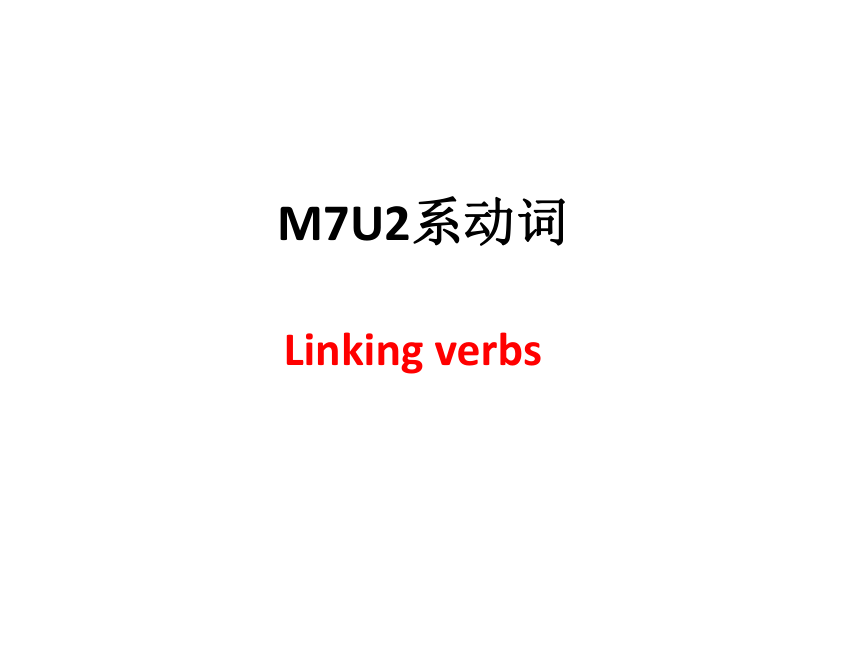
|
|
| 格式 | zip | ||
| 文件大小 | 92.5KB | ||
| 资源类型 | 教案 | ||
| 版本资源 | 牛津译林版 | ||
| 科目 | 英语 | ||
| 更新时间 | 2020-02-28 00:00:00 | ||
图片预览

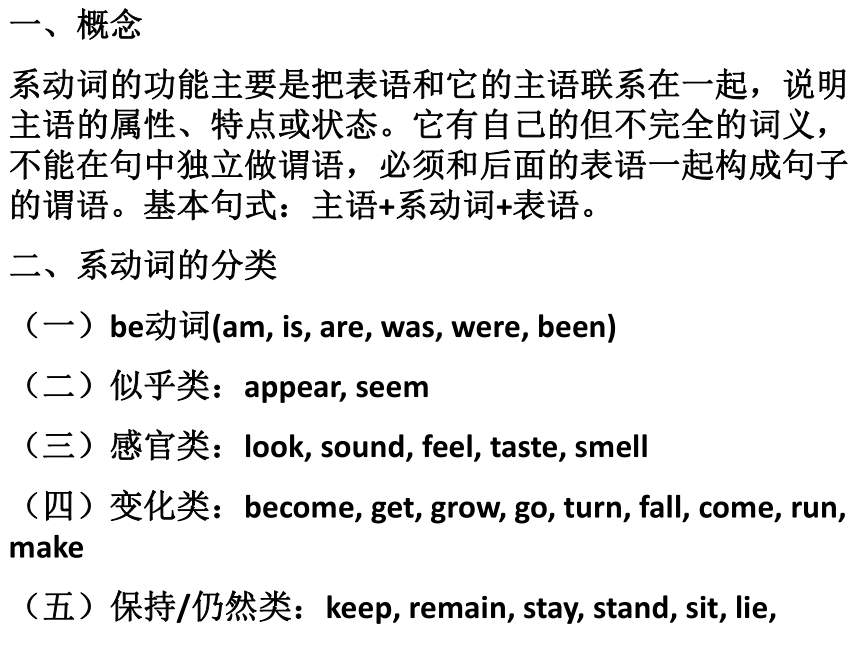

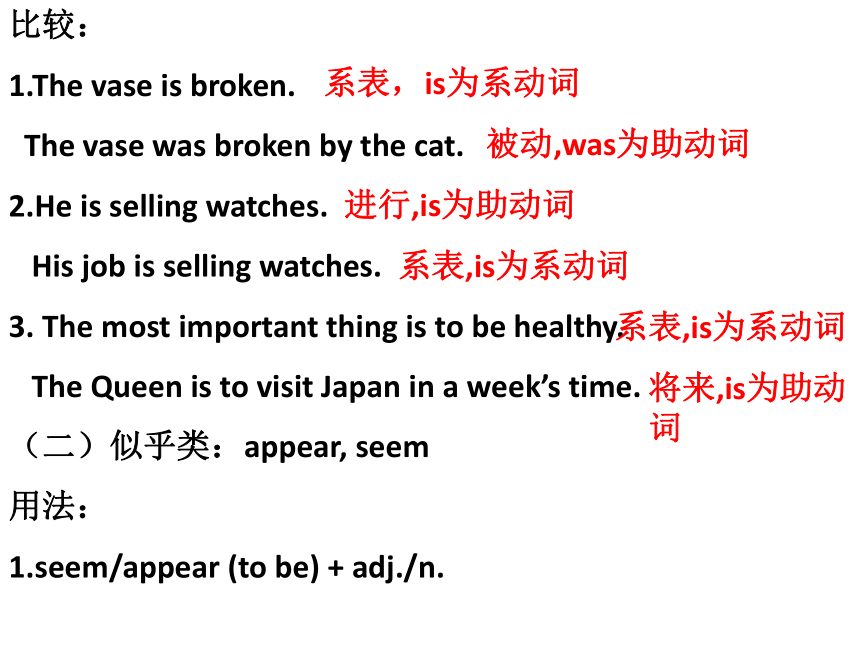
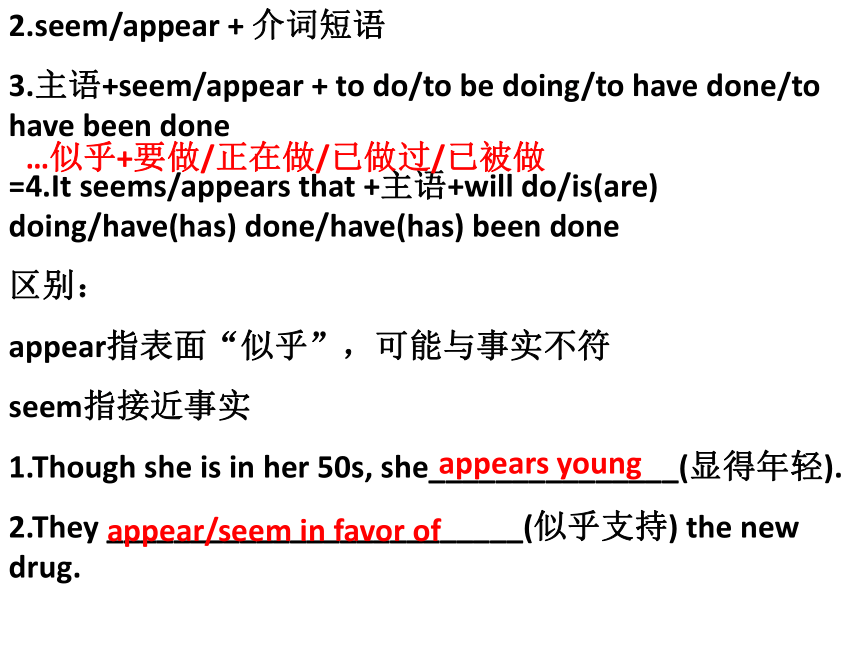
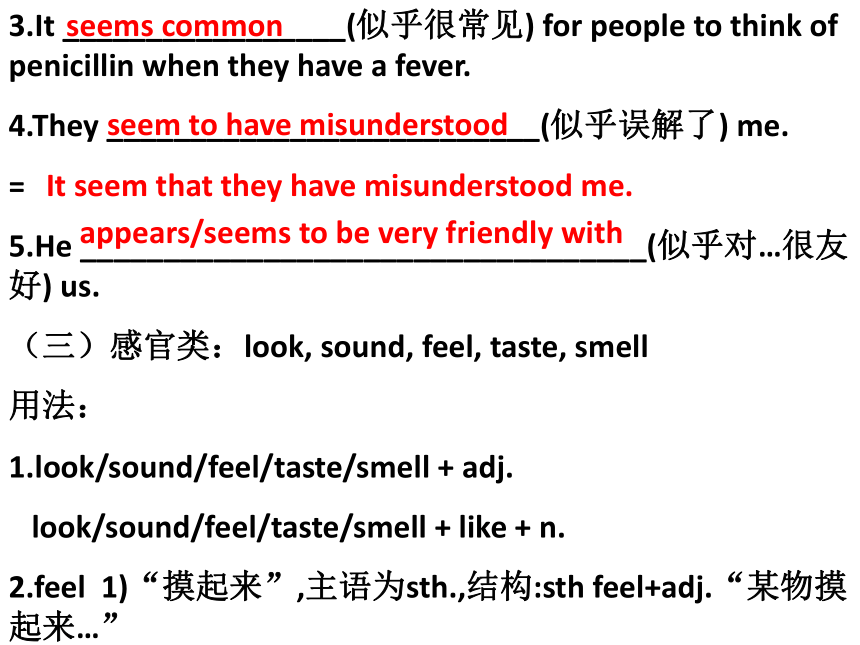
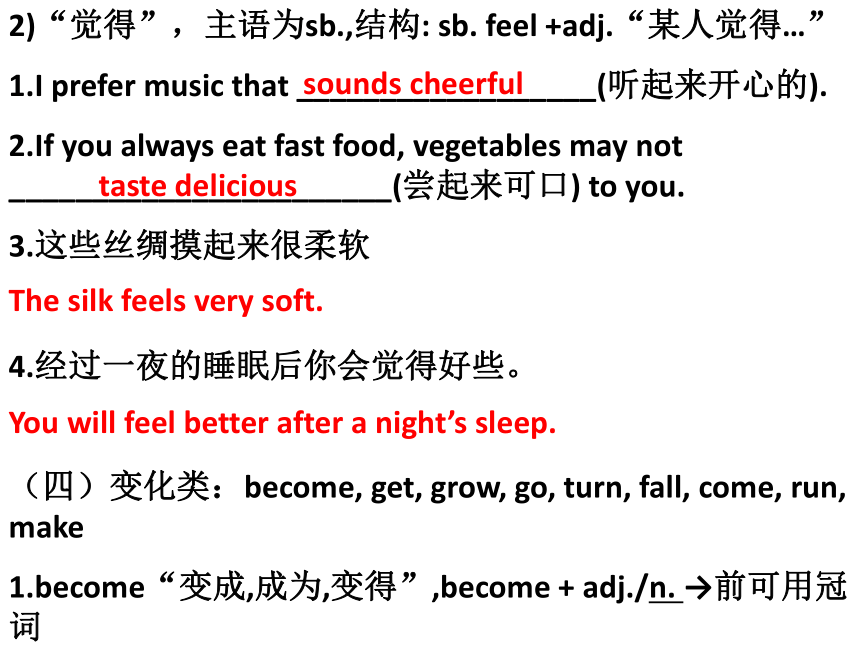
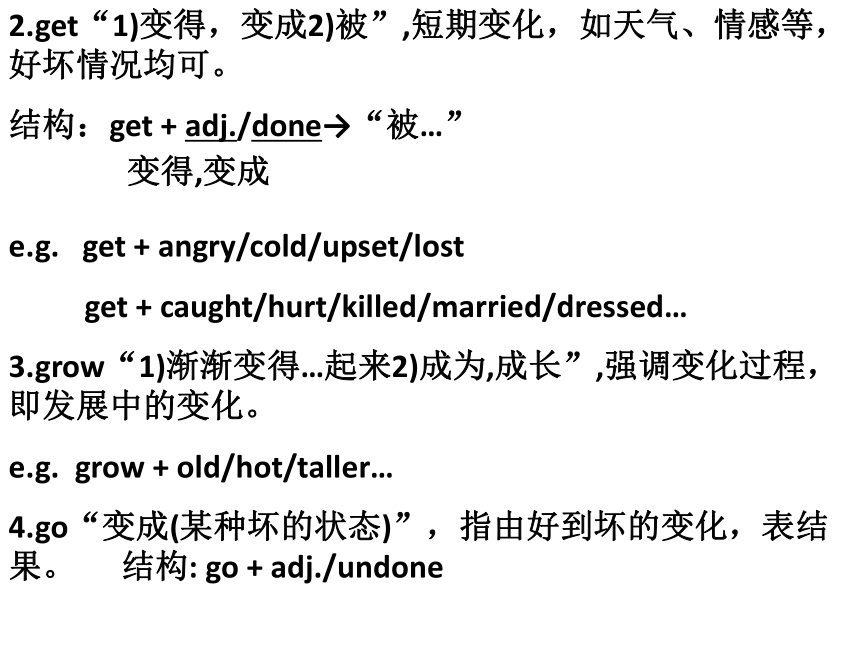
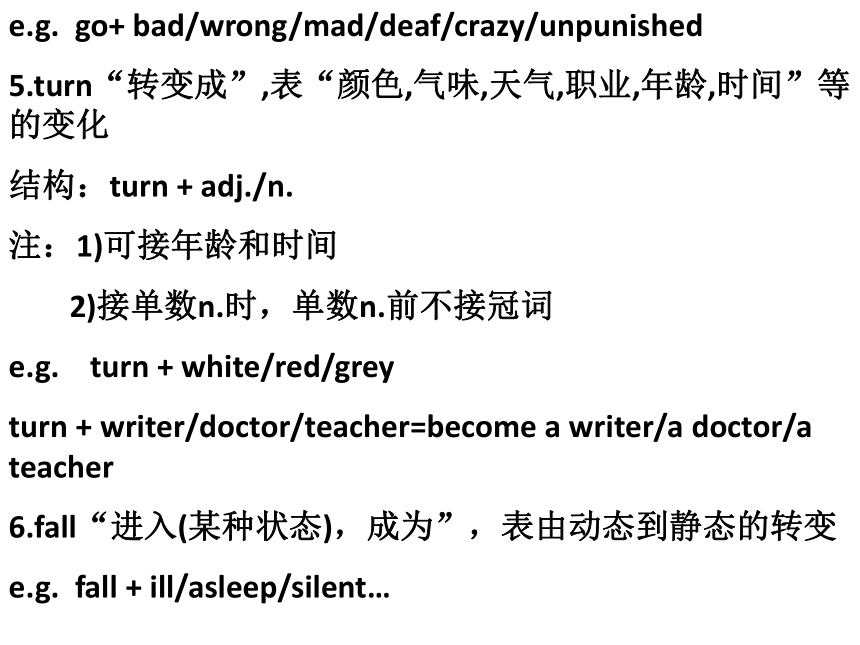
文档简介
(共25张PPT)
M7U2系动词
Linking verbs
一、概念
系动词的功能主要是把表语和它的主语联系在一起,说明主语的属性、特点或状态。它有自己的但不完全的词义,不能在句中独立做谓语,必须和后面的表语一起构成句子的谓语。基本句式:主语+系动词+表语。
二、系动词的分类
(一)be动词(am, is, are, was, were, been)
(二)似乎类:appear, seem
(三)感官类:look, sound, feel, taste, smell
(四)变化类:become, get, grow, go, turn, fall, come, run, make
(五)保持/仍然类:keep, remain, stay, stand, sit, lie,
continue, lay
(六)终止类:prove, turn out
分类讲解:
(一)be动词(am, is, are, was, were, been)作系动词
1. I am Sandy.
2. Surfing the Internet is really interesting.
3.We are now in need of English teachers.
4. The question is how to solve the problem.
5. What we want to know is who will give us the lecture next Monday.
比较:
1.The vase is broken.
The vase was broken by the cat.
2.He is selling watches.
His job is selling watches.
3. The most important thing is to be healthy.
The Queen is to visit Japan in a week’s time.
(二)似乎类:appear, seem
用法:
1.seem/appear (to be) + adj./n.
系表,is为系动词
被动,was为助动词
进行,is为助动词
系表,is为系动词
系表,is为系动词
将来,is为助动词
2.seem/appear + 介词短语
3.主语+seem/appear + to do/to be doing/to have done/to have been done
=4.It seems/appears that +主语+will do/is(are) doing/have(has) done/have(has) been done
区别:
appear指表面“似乎”,可能与事实不符
seem指接近事实
1.Though she is in her 50s, she_______________(显得年轻).
2.They _________________________(似乎支持) the new drug.
appears young
appear/seem in favor of
…似乎+要做/正在做/已做过/已被做
3.It _________________(似乎很常见) for people to think of penicillin when they have a fever.
4.They __________________________(似乎误解了) me.
=
5.He __________________________________(似乎对…很友好) us.
(三)感官类:look, sound, feel, taste, smell
用法:
1.look/sound/feel/taste/smell + adj.
look/sound/feel/taste/smell + like + n.
2.feel 1)“摸起来”,主语为sth.,结构:sth feel+adj.“某物摸起来…”
seems common
seem to have misunderstood
It seem that they have misunderstood me.
appears/seems to be very friendly with
2)“觉得”,主语为sb.,结构: sb. feel +adj.“某人觉得…”
1.I prefer music that __________________(听起来开心的).
2.If you always eat fast food, vegetables may not _______________________(尝起来可口) to you.
3.这些丝绸摸起来很柔软
4.经过一夜的睡眠后你会觉得好些。
(四)变化类:become, get, grow, go, turn, fall, come, run, make
1.become“变成,成为,变得”,become + adj./n. →前可用冠词
sounds cheerful
taste delicious
The silk feels very soft.
You will feel better after a night’s sleep.
2.get“1)变得,变成2)被”,短期变化,如天气、情感等,好坏情况均可。
结构:get + adj./done→“被…”
e.g. get + angry/cold/upset/lost
get + caught/hurt/killed/married/dressed…
3.grow“1)渐渐变得…起来2)成为,成长”,强调变化过程,即发展中的变化。
e.g. grow + old/hot/taller…
4.go“变成(某种坏的状态)”,指由好到坏的变化,表结果。 结构: go + adj./undone
变得,变成
e.g. go+ bad/wrong/mad/deaf/crazy/unpunished
5.turn“转变成”,表“颜色,气味,天气,职业,年龄,时间”等的变化
结构:turn + adj./n.
注:1)可接年龄和时间
2)接单数n.时,单数n.前不接冠词
e.g. turn + white/red/grey
turn + writer/doctor/teacher=become a writer/a doctor/a teacher
6.fall“进入(某种状态),成为”,表由动态到静态的转变
e.g. fall + ill/asleep/silent…
7.come“变成,成为”,和go相反,表变好或便成为已知的状态。
e.g. Come + true…
8.run“变成”,表发展的状态不是人们所希望的
e.g. run + wild/small/short/dry…
9.make 1)达到某种状态2)能成为=become,后接n.时,n.前 常加限定词
e.g. make sure (of…)/certain (of…)/a good teacher
野蛮的
短缺的
→干枯的
确保…
成为一名好老师
1.It’s nothing to _________ excited about it.
2.You will _________ used to it.
3.Maple trees _________ red inn autumn.
4.The murders must not ________ unpunished.
5.They ___________ good friends.
6.If you look into the matter, everything will ________ clear.
7.He has __________ fifty.
8.It has just ________ two.
9.Twenty years later, he __________ teacher.
get
grow
turn
go
became
come
turned
turned
turned
(五)保持/仍然类:keep, remain, stay, stand, sit, lie, continue, lay
1.keep“保持…状态”
结构:keep + adj./介词短语/adv.
e.g. keep + fit/healthy/quiet/calm/in touch with sb./warm/safe/still…
2.stay“保持…状态”,常可与keep互换,表前后无比较。
e.g. stay + still/healthy/calm/young/quiet/warm/the same
3.remain“仍然存在…状态”,指某种状态前后无变化,且前后有比较。
结构:1)remain + n./adj./v-ed/v-ing/介词短语
2)sth. remain + to be done
It remain to be done + 连词-主语从句
“某事尚未被…, …有待于被…”
3)sb. remain seated 仍然坐着
4.stand/lie still 站着/躺着不动
5.lay“处于…状态”,lay open“打开着”
6.continue“继续,仍旧”
continue + silent/wet and cold“继续沉默/持续湿冷”
1.我从来不看已经做了什么,我只看还有什么要做。
2.你是否正确,尚无定论。
I never see what has been done; I only see what remains to be done.
It remains to be seen whether you are right.
(六)终止类系动词:prove, turn out“证明是,结果是”
结构: 1.prove + (to be) + n./adj./介词短语
2.主语 + turn out + (to be) + n./adj.
=It turns out that + 主语 + is(are) + n./adj.
事实证明了这本书非常成功。
事实表明他是一个诚实的朋友。
The book has proved (to be) very successful.
He proved (to be) an honest friend.
出乎意料的是,那天天气特别好。
Unexpectedly, the weather turned out pretty nice that day.
=Unexpectedly, it turned out that the weather was pretty nice that day.
三、其他注意问题
1.系动词无被动语态,做非谓语动词时常用v-ing形式,但有些系动词还可做实意动词的vt。时,有被动。
判断:
1)The apple is tasted good.
The apple is tasted by me.
The apple tasted good.
2)I afraid he won’t come tomorrow.
I am afraid he won’t come tomorrow.
3)His hair changed grey.
His hair turned/grew grey.
F
T
T
F
T
F
T
4)His hands feel coldly.
His hands feel cold.
2.1)含连系动词be的句子变为疑问句,be的正确形式直接提前;否定时,be后加not。
Mr. William is in the office.
2)其他连系动词变为疑问句或否定句时与实意动词相同,要借助于助动词do/did/does。
结构: Do/Did/Does + 主语 + 系动词(原形)…?
主语 + don’t/didn’t/doesn’t + 系动词(原形)….
F
T
Is Mr. William in the office?
Mr. William isn’t in the office.
The language spoken in these places stayed the same.
3.对系动词后的表语提问
1)表语为adj.,常用how提问
The book is interesting.
2)表语为n.,常用what提问
My father is a teacher.
3)adv.、 num.(数词)、 pron.、介词短语、分词、动名词做表语时,分别表示不同的含义,提问时,针对性要强。
The professor is at home.
Did the language spoken in these places stay the same?
The language spoken in these places didn’t stay the same.
How is the book?
What is your father?
Where is the professor?
The computer is mine.
Five and six is eleven.
Practice
1.---Do you like the material?
---Yes, it _________ very soft.
is feeling B. felt C. feels D. is felt
2.Having a trip abroad is certainly good for the old couple, but it remains ______ whether they will enjoy it.
A. to see B. to be seen C. seeing D. seen
Whose computer is it?
How much is five and six?
C
B
3._____ good, the food has been sold out.
Tasted B. Having been tasted C. Tasting D. To taste
4.Ladies and gentlemen, please remain ______ until the plane has come to a complete stop.
A. seated B. seating C. to seat D. seat
5.The story of his life _____ interesting.
A. is sounded B. is sounding C. has sounded D. sounds
6.The dish _____ nice, but the milk _____ sour.
A. is smelt; is smelt B. is smelt; smells
C. smells; is smelt D. smells; smells
C
A
D
D
7.His voice ______ as if he has a cold.
sounds B. listens C. hears D. seems
8.These apples taste ______.
A. to be good B. to be well C. well D. good
9.---Do you like the shirt? ---Yes, it ______ very soft.
A. feels B. felt C. is feeling D. is felt
10.She ______ like her mother in character.
looks B. seems C. is D. feels
11.His wish to become a driver has _____ true.
A. turned B. realized C. come D. grown
A
D
A
A
C
12.The moment Mr. Zhang went to bed, he _____ asleep.
kept B. got C. fell D. fall
13.He _____ much younger than he really is.
appears B. grows C. becomes D. turns
14.The flowers in the garden ______ sweet.
appears B. taste C. become D. smell
15.I don’t want _____ like I’m speaking ill of anybody, but the manager’s plan is unfair.
to sound B. to be sounded C. sounding
D. to have sounded
C
A
D
A
16.The pilot asked all the passengers on board to remain ____ as the plane was making a landing.
seat B. seating C. seated D. to be seating
17.I haven’t seen Mary these past few days. I’m afraid she _____ herself for some time.
isn’t feeling B. hasn’t been feeling
C. hadn’t been feeling D. wasn’t feeling
18.What he said caused us ________.
to feel frightening B. feel frightened
C. feeling frighten D. to feel frightened
C
B
D
19.We don’t care if a hunting dog smells _____, but we really don’t want him to smell _______.
A. well; well B. bad; bad C. well; badly D. badly; bad
D
M7U2系动词
Linking verbs
一、概念
系动词的功能主要是把表语和它的主语联系在一起,说明主语的属性、特点或状态。它有自己的但不完全的词义,不能在句中独立做谓语,必须和后面的表语一起构成句子的谓语。基本句式:主语+系动词+表语。
二、系动词的分类
(一)be动词(am, is, are, was, were, been)
(二)似乎类:appear, seem
(三)感官类:look, sound, feel, taste, smell
(四)变化类:become, get, grow, go, turn, fall, come, run, make
(五)保持/仍然类:keep, remain, stay, stand, sit, lie,
continue, lay
(六)终止类:prove, turn out
分类讲解:
(一)be动词(am, is, are, was, were, been)作系动词
1. I am Sandy.
2. Surfing the Internet is really interesting.
3.We are now in need of English teachers.
4. The question is how to solve the problem.
5. What we want to know is who will give us the lecture next Monday.
比较:
1.The vase is broken.
The vase was broken by the cat.
2.He is selling watches.
His job is selling watches.
3. The most important thing is to be healthy.
The Queen is to visit Japan in a week’s time.
(二)似乎类:appear, seem
用法:
1.seem/appear (to be) + adj./n.
系表,is为系动词
被动,was为助动词
进行,is为助动词
系表,is为系动词
系表,is为系动词
将来,is为助动词
2.seem/appear + 介词短语
3.主语+seem/appear + to do/to be doing/to have done/to have been done
=4.It seems/appears that +主语+will do/is(are) doing/have(has) done/have(has) been done
区别:
appear指表面“似乎”,可能与事实不符
seem指接近事实
1.Though she is in her 50s, she_______________(显得年轻).
2.They _________________________(似乎支持) the new drug.
appears young
appear/seem in favor of
…似乎+要做/正在做/已做过/已被做
3.It _________________(似乎很常见) for people to think of penicillin when they have a fever.
4.They __________________________(似乎误解了) me.
=
5.He __________________________________(似乎对…很友好) us.
(三)感官类:look, sound, feel, taste, smell
用法:
1.look/sound/feel/taste/smell + adj.
look/sound/feel/taste/smell + like + n.
2.feel 1)“摸起来”,主语为sth.,结构:sth feel+adj.“某物摸起来…”
seems common
seem to have misunderstood
It seem that they have misunderstood me.
appears/seems to be very friendly with
2)“觉得”,主语为sb.,结构: sb. feel +adj.“某人觉得…”
1.I prefer music that __________________(听起来开心的).
2.If you always eat fast food, vegetables may not _______________________(尝起来可口) to you.
3.这些丝绸摸起来很柔软
4.经过一夜的睡眠后你会觉得好些。
(四)变化类:become, get, grow, go, turn, fall, come, run, make
1.become“变成,成为,变得”,become + adj./n. →前可用冠词
sounds cheerful
taste delicious
The silk feels very soft.
You will feel better after a night’s sleep.
2.get“1)变得,变成2)被”,短期变化,如天气、情感等,好坏情况均可。
结构:get + adj./done→“被…”
e.g. get + angry/cold/upset/lost
get + caught/hurt/killed/married/dressed…
3.grow“1)渐渐变得…起来2)成为,成长”,强调变化过程,即发展中的变化。
e.g. grow + old/hot/taller…
4.go“变成(某种坏的状态)”,指由好到坏的变化,表结果。 结构: go + adj./undone
变得,变成
e.g. go+ bad/wrong/mad/deaf/crazy/unpunished
5.turn“转变成”,表“颜色,气味,天气,职业,年龄,时间”等的变化
结构:turn + adj./n.
注:1)可接年龄和时间
2)接单数n.时,单数n.前不接冠词
e.g. turn + white/red/grey
turn + writer/doctor/teacher=become a writer/a doctor/a teacher
6.fall“进入(某种状态),成为”,表由动态到静态的转变
e.g. fall + ill/asleep/silent…
7.come“变成,成为”,和go相反,表变好或便成为已知的状态。
e.g. Come + true…
8.run“变成”,表发展的状态不是人们所希望的
e.g. run + wild/small/short/dry…
9.make 1)达到某种状态2)能成为=become,后接n.时,n.前 常加限定词
e.g. make sure (of…)/certain (of…)/a good teacher
野蛮的
短缺的
→干枯的
确保…
成为一名好老师
1.It’s nothing to _________ excited about it.
2.You will _________ used to it.
3.Maple trees _________ red inn autumn.
4.The murders must not ________ unpunished.
5.They ___________ good friends.
6.If you look into the matter, everything will ________ clear.
7.He has __________ fifty.
8.It has just ________ two.
9.Twenty years later, he __________ teacher.
get
grow
turn
go
became
come
turned
turned
turned
(五)保持/仍然类:keep, remain, stay, stand, sit, lie, continue, lay
1.keep“保持…状态”
结构:keep + adj./介词短语/adv.
e.g. keep + fit/healthy/quiet/calm/in touch with sb./warm/safe/still…
2.stay“保持…状态”,常可与keep互换,表前后无比较。
e.g. stay + still/healthy/calm/young/quiet/warm/the same
3.remain“仍然存在…状态”,指某种状态前后无变化,且前后有比较。
结构:1)remain + n./adj./v-ed/v-ing/介词短语
2)sth. remain + to be done
It remain to be done + 连词-主语从句
“某事尚未被…, …有待于被…”
3)sb. remain seated 仍然坐着
4.stand/lie still 站着/躺着不动
5.lay“处于…状态”,lay open“打开着”
6.continue“继续,仍旧”
continue + silent/wet and cold“继续沉默/持续湿冷”
1.我从来不看已经做了什么,我只看还有什么要做。
2.你是否正确,尚无定论。
I never see what has been done; I only see what remains to be done.
It remains to be seen whether you are right.
(六)终止类系动词:prove, turn out“证明是,结果是”
结构: 1.prove + (to be) + n./adj./介词短语
2.主语 + turn out + (to be) + n./adj.
=It turns out that + 主语 + is(are) + n./adj.
事实证明了这本书非常成功。
事实表明他是一个诚实的朋友。
The book has proved (to be) very successful.
He proved (to be) an honest friend.
出乎意料的是,那天天气特别好。
Unexpectedly, the weather turned out pretty nice that day.
=Unexpectedly, it turned out that the weather was pretty nice that day.
三、其他注意问题
1.系动词无被动语态,做非谓语动词时常用v-ing形式,但有些系动词还可做实意动词的vt。时,有被动。
判断:
1)The apple is tasted good.
The apple is tasted by me.
The apple tasted good.
2)I afraid he won’t come tomorrow.
I am afraid he won’t come tomorrow.
3)His hair changed grey.
His hair turned/grew grey.
F
T
T
F
T
F
T
4)His hands feel coldly.
His hands feel cold.
2.1)含连系动词be的句子变为疑问句,be的正确形式直接提前;否定时,be后加not。
Mr. William is in the office.
2)其他连系动词变为疑问句或否定句时与实意动词相同,要借助于助动词do/did/does。
结构: Do/Did/Does + 主语 + 系动词(原形)…?
主语 + don’t/didn’t/doesn’t + 系动词(原形)….
F
T
Is Mr. William in the office?
Mr. William isn’t in the office.
The language spoken in these places stayed the same.
3.对系动词后的表语提问
1)表语为adj.,常用how提问
The book is interesting.
2)表语为n.,常用what提问
My father is a teacher.
3)adv.、 num.(数词)、 pron.、介词短语、分词、动名词做表语时,分别表示不同的含义,提问时,针对性要强。
The professor is at home.
Did the language spoken in these places stay the same?
The language spoken in these places didn’t stay the same.
How is the book?
What is your father?
Where is the professor?
The computer is mine.
Five and six is eleven.
Practice
1.---Do you like the material?
---Yes, it _________ very soft.
is feeling B. felt C. feels D. is felt
2.Having a trip abroad is certainly good for the old couple, but it remains ______ whether they will enjoy it.
A. to see B. to be seen C. seeing D. seen
Whose computer is it?
How much is five and six?
C
B
3._____ good, the food has been sold out.
Tasted B. Having been tasted C. Tasting D. To taste
4.Ladies and gentlemen, please remain ______ until the plane has come to a complete stop.
A. seated B. seating C. to seat D. seat
5.The story of his life _____ interesting.
A. is sounded B. is sounding C. has sounded D. sounds
6.The dish _____ nice, but the milk _____ sour.
A. is smelt; is smelt B. is smelt; smells
C. smells; is smelt D. smells; smells
C
A
D
D
7.His voice ______ as if he has a cold.
sounds B. listens C. hears D. seems
8.These apples taste ______.
A. to be good B. to be well C. well D. good
9.---Do you like the shirt? ---Yes, it ______ very soft.
A. feels B. felt C. is feeling D. is felt
10.She ______ like her mother in character.
looks B. seems C. is D. feels
11.His wish to become a driver has _____ true.
A. turned B. realized C. come D. grown
A
D
A
A
C
12.The moment Mr. Zhang went to bed, he _____ asleep.
kept B. got C. fell D. fall
13.He _____ much younger than he really is.
appears B. grows C. becomes D. turns
14.The flowers in the garden ______ sweet.
appears B. taste C. become D. smell
15.I don’t want _____ like I’m speaking ill of anybody, but the manager’s plan is unfair.
to sound B. to be sounded C. sounding
D. to have sounded
C
A
D
A
16.The pilot asked all the passengers on board to remain ____ as the plane was making a landing.
seat B. seating C. seated D. to be seating
17.I haven’t seen Mary these past few days. I’m afraid she _____ herself for some time.
isn’t feeling B. hasn’t been feeling
C. hadn’t been feeling D. wasn’t feeling
18.What he said caused us ________.
to feel frightening B. feel frightened
C. feeling frighten D. to feel frightened
C
B
D
19.We don’t care if a hunting dog smells _____, but we really don’t want him to smell _______.
A. well; well B. bad; bad C. well; badly D. badly; bad
D
